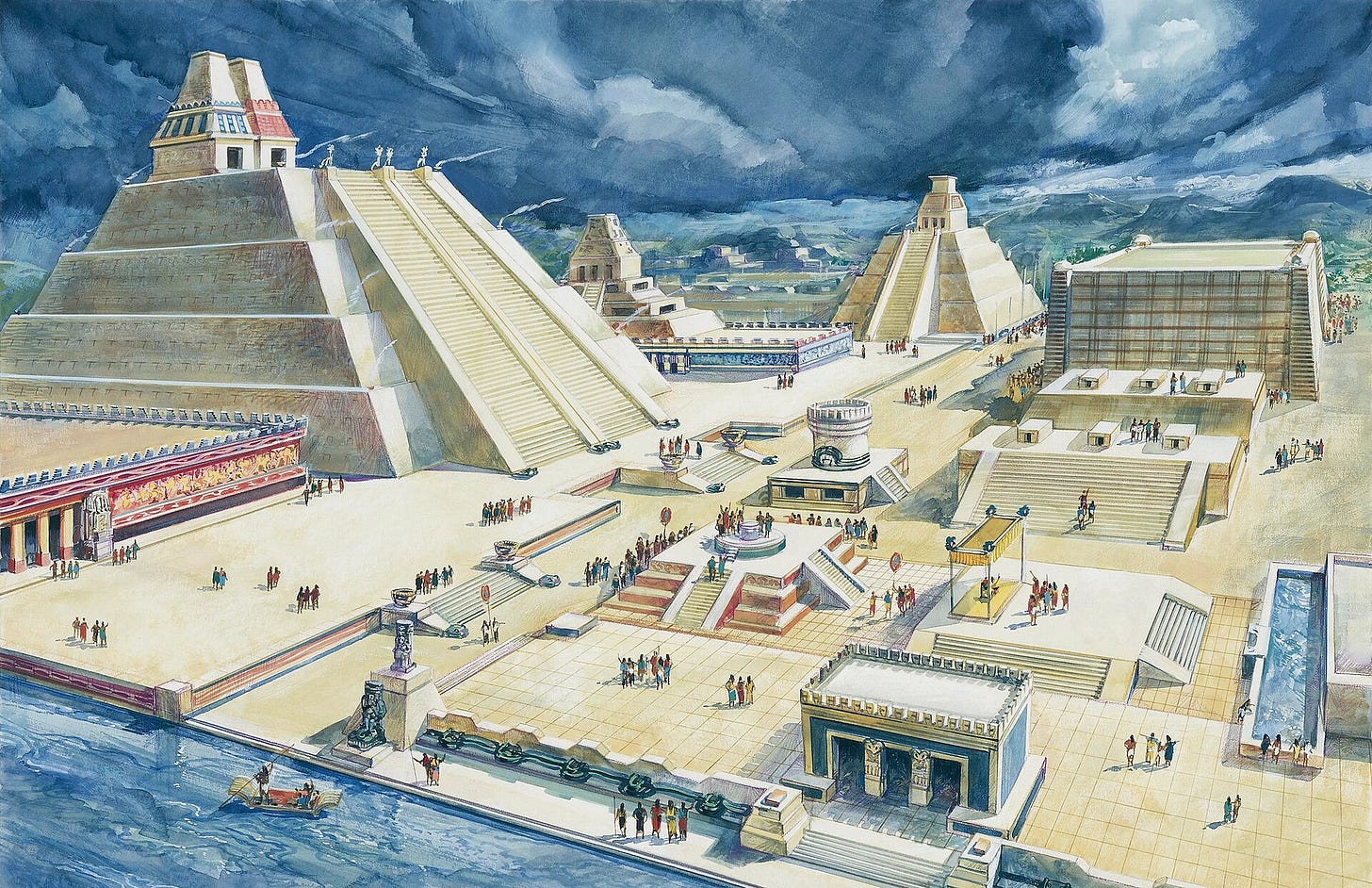The Return to Tenochtitlán
Or how the Mesoamerican worldview is making a most unexpected comeback
What is man´s destiny? Where is his place on this rocky world that he calls Earth? How best to understand the purpose of life? These be no easy questions and across various times and places wise men sought to discover the answer. In their formulation, these answers varied greatly and in their essence they varied less, for all their various iterations could have been broken down into a handful of major themes: whether man is here to obey God, or surrender himself to the caring Emperor and his officials, whether he can hope for a better afterlife or renounce any such notion whatsoever and keep his focus to the immediate present and there to seek to win glory or pleasures - such be the varied understanding of the human predicament in the Old World. Yet from amongst these types identified by Krejčí,1 there remains one way of considering the predicament of man that was peculiar to the New World - namely the cosmocentric world-feeling.

The Mesoamerican world-feeling is thus fundamentally distinct from what we are familiar with in the Old World. For them, the world is ever-changing, a world of becoming and not the become, a dynamic rather than a static world. To them, the world is held together by a cosmic energy called teotl which permeates all and all things in the universe are be thus interrelated and mutually dependent. Man himself needs maize to survive and maize needs man to propagate its seeds. By analogy, the Mesoamerican man needs the gods but the gods need humans to keep them alive and it is mans duty to keep them alive, by means of transfering the cosmic energy, teotl, unto them.2 In short, the purpose of man is to keep the universe in existence.3
One may have thought that this world-feeling has long since been extinguished . However, this cosmocentric paradigm has made a most unexpected comeback by demanding human sacrifice necessary to keep the cosmos in existence. Namely the pervasive mission to hit Net Zero and Carbon Neutrality. But this logic transcends the climate hysteria and the quest to escape the Mathusian trap.
The obligation to maintain the flow of teotl is embedded in this constant pressure to keep the flow of goods, transactions and information. It is imbedded in the idolisation of GDP growth, of keeping money flowing, in the culture of Black Friday sales and constant sharing of (often useless) information on social media.
Last but not least, cancel culture and the promotion of blaming entire demographic groups for the sorry state of the world is human sacrifice par excellence. A select few are punished for an opinion they uttered in a public ritual involving ostracisation, public shaming, career destruction and silencing , a ritual that serves to maintain and strengthen the values of the group whilst warning others of consequences of slightest transgressions from groupthink. The victim, like the sacrificial captive of old, is cast out to ensure the continued stability of the cosmic balance and to promote social justice. The forms have changed and the whole process has become demythologised, but the underlying logic remains. Social justice may be maintained only if those few who beg to differ be sacrificed.
The prevailing notion that humanity possesses both the capacity and obligation to sustain the world through sacrifice echoes the Mesoamerican understanding of cosmic balance. Today, the gods may no longer demand the blood of captives upon the altar, but the logic of perpetual suffering remains. The imperative to reduce carbon emissions, to curb industrial activity, to prevent the use of cheap energy and to engage in acts of self-denial in service of a greater ecological order reveals a striking continuity with ancient cosmology.
This modern ethos, like its Mesoamerican antecedent, rests on the conviction that without continuous sacrifice, the world itself risks collapse. The Greta Thunbergs of the world no longer wield obsidian blades atop stepped pyramids, but the basic logic remains the same. As a high school student, there was something deeply shocking when I first heard about human sacrifice in Mesoamerica. Today, it seems that the postmodern Left have returned to Tenochtitlán.
KREJČÍ Jaroslav: Postižitelné proudy dějin
MAFFIE, James: Aztec Philosophy: Understanding the World in Motion
KREJČÍ Jaroslav: Postižitelné proudy dějin
https://europeanconservative.com/articles/news/von-der-leyen-to-toughen-climate-laws-in-exchange-for-political-favours/



